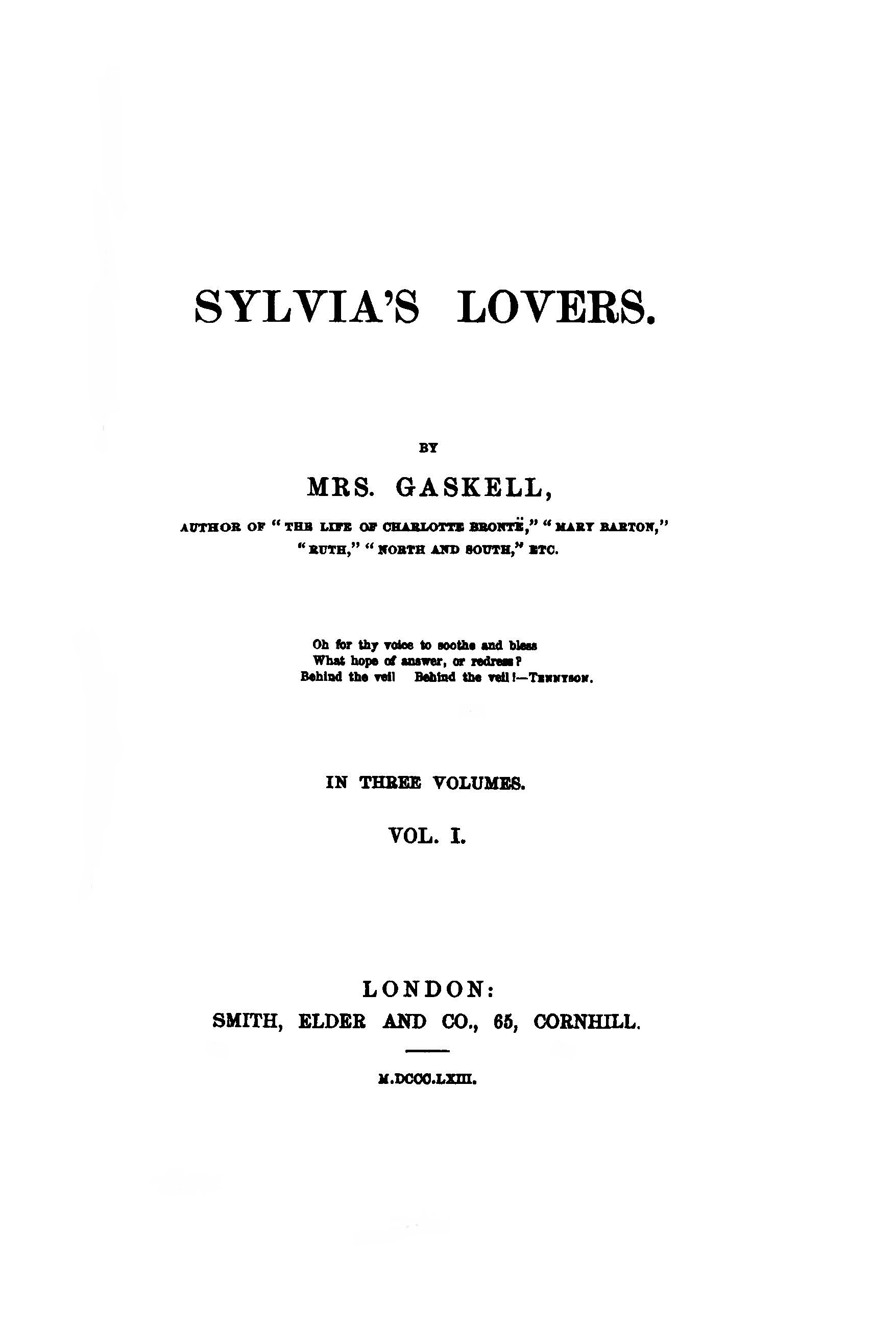Sylvia's Lovers on:
[Wikipedia]
[Google]
[Amazon]
 ''Sylvia's Lovers'' (1863) is a novel written by
''Sylvia's Lovers'' (1863) is a novel written by
 ''Sylvia's Lovers'' (1863) is a novel written by
''Sylvia's Lovers'' (1863) is a novel written by Elizabeth Gaskell
Elizabeth Cleghorn Gaskell (''née'' Stevenson; 29 September 1810 – 12 November 1865), often referred to as Mrs Gaskell, was an English novelist, biographer and short story writer. Her novels offer a detailed portrait of the lives of many st ...
, which she called "the saddest story I ever wrote".
Plot summary
The novel begins in the 1790s in the coastal town of Monkshaven (modeled onWhitby
Whitby is a seaside town, port and civil parish in the Scarborough borough of North Yorkshire, England. Situated on the east coast of Yorkshire at the mouth of the River Esk, Whitby has a maritime, mineral and tourist heritage. Its East Clif ...
, England) against the background of the practice of impressment
Impressment, colloquially "the press" or the "press gang", is the taking of men into a military or naval force by compulsion, with or without notice. European navies of several nations used forced recruitment by various means. The large size of ...
during the early phases of the Napoleonic Wars
The Napoleonic Wars (1803–1815) were a series of major global conflicts pitting the French Empire and its allies, led by Napoleon I, against a fluctuating array of European states formed into various coalitions. It produced a period of Fren ...
. Sylvia Robson lives happily with her parents on a farm, and is passionately loved by her rather dull Quaker
Quakers are people who belong to a historically Protestant Christian set of Christian denomination, denominations known formally as the Religious Society of Friends. Members of these movements ("theFriends") are generally united by a belie ...
cousin Philip. She, however, meets and falls in love with Charlie Kinraid, a dashing sailor on a whaling vessel, and they become secretly engaged. When Kinraid goes back to his ship, he is forcibly enlisted in the Royal Navy by a press gang, a scene witnessed by Philip. Philip does not tell Sylvia of the incident nor relay to her Charlie's parting message and, believing her lover is dead, Sylvia eventually marries her cousin. This act is primarily prompted out of gratefulness for Philip's assistance during a difficult time following her father's imprisonment and subsequent execution for leading a revengeful raid on press-gang collaborators. They have a daughter. Inevitably, Kinraid returns to claim Sylvia and she discovers that Philip knew all the time that he was still alive. Philip leaves her in despair at her subsequent rage and rejection, but she refuses to live with Kinraid because of her child.
Philip joins the army under a pseudonym, and ends up fighting in the Napoleonic wars, where he saves Kinraid's life. Kinraid returns to Britain, and marries. His wife, who knows nothing of their history together, informs Sylvia that her husband is a great military leader. Kinraid's marriage suggests to Sylvia that he was not as faithful to her as she had remained to him, and she then realizes she is actually in love with Philip. Philip, meanwhile horribly disfigured by a shipboard explosion, returns to the small Northumbrian village to try to secretly get a glimpse of his child. He ends up staying with the sister of a servant of Sylvia's deceased parents, and rescues his child when she nearly drowns. He is fatally injured while saving his daughter, but his identity then becomes known and he is reconciled with his wife on his deathbed.
Characters
* Sylvia Robson - the heroine * Philip Hepburn - Sylvia's cousin (her mother’s nephew), works in a draper's shop * Charley Kinraid - a specksioneer or harpooner on a whaling ship * Daniel Robson - Sylvia's father, a former whaler * Bell Robson - Sylvia's mother * Molly Corney - Sylvia's friend * Hester Rose - also works in the draper's shop * Alice Rose - Hester's mother * press-gangs - gangs who capture and force men to fight against FranceReception
The novel is one of Elizabeth Gaskell's least known works. John McVeagh has pointed to a "sudden lapse into melodrama" which "reduces and cheapens an interesting story". The novel does seem to show signs of hurry at the conclusion. For instance, detailed attention is given to Sylvia's growing infatuation with Kinraid, but her eventual disillusionment with him following his hasty marriage at the end of the story is described in only a few sentences. As her obsessive love for him has ruled her life, it does seem surprising that this receives such a cursory treatment. TJW, in an article in the ''Modern Language Review
''Modern Language Review'' is the journal of the Modern Humanities Research Association ( MHRA). It is one of the oldest journals in the field of modern languages. Founded in 1905, it has published more than 3,000 articles and 20,000 book reviews. ...
'',. comments that 'Kinraid is eventually shown to be a shallow character, but Mrs Gaskell's portrayal of him is so superficial that we find it hard to appreciate the strength of Sylvia Robson's love for him'. However, it has also received praise and been compared positively with the writings of George Eliot
Mary Ann Evans (22 November 1819 – 22 December 1880; alternatively Mary Anne or Marian), known by her pen name George Eliot, was an English novelist, poet, journalist, translator, and one of the leading writers of the Victorian era. She wro ...
, particularly ''Adam Bede
''Adam Bede'' was the first novel by Mary Ann Evans (George Eliot), and was published in 1859. It was published pseudonymously, even though Evans was a well-published and highly respected scholar of her time. The novel has remained in print ev ...
''.
References
External links
* {{Elizabeth Gaskell 1863 British novels Novels by Elizabeth Gaskell English novels Fiction set in the 1790s